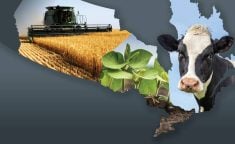Trade is at the top of both the national and agricultural agenda in the federal election.
That’s according to participants at a pre-election panel hosted March 18 by the Manitoba Farm Writers and Broadcasters Association.
Cam Dahl of the Manitoba Pork Council and Colin Hornby of Keystone Agricultural Producers both flagged the issue as the most pressing.
Read Also

Canadian Cattle Association names Brocklebank CEO
Andrea Brocklebank will take over as chief executive officer of the Canadian Cattle Association effective March 1.
“Nothing else really matters,” Hornby told attendees. “How does the next government deal with the threats from our historically reliable trading partners, the U.S. and China?”
Dahl noted the issue might be at a full boil now, with threats from key trading partners having blown up in the past couple of months, but it’s been simmering in the background for some time.
“This didn’t start on Nov. 5,” he said, referencing the U.S. election that handed the reigns to President Donald Trump. “The world was spinning towards protectionism long before that. Pork producers in Manitoba are caught between tariffs in China and potential tariffs from the U.S. Those are a couple of our largest markets.”
Why it matters: Canada is waging a trade war on two fronts, and the stakes in the next federal election are higher than ever for Canadian farmers.
The effect of that market upset will be felt far beyond the farm gate, he noted, and will reverberate throughout the province. More than 22,000 Manitobans are employed in the pork industry, including 2,500 at a single bacon plant in Winnipeg. The sector contributes $2.2 billion to the provincial economy annually, and it’s almost entirely export-oriented. Of the more than eight million hogs Manitoba produces annually, 90 per cent leave the province either as processed meat and meat products, or as about three million live animals shipped into the U.S. each year.
“Those few days tariffs were in place, we saw about a 15 per cent drop in cash prices for live animals going into the U.S., so we can see that impact happens extremely quickly,” Dahl said, referencing the brief period between March 4 to 6 when the full weight of 25 per cent U.S. tariffs against most Canadian goods were in place.
The U.S. later announced a now quickly expiring grace period in which products claimed under the Canada-U.S.-Mexico Agreement would be exempt. That exemption runs out April 2.
On March 8, China jumped in with 100 per cent tariffs against Canadian canola oil, meal and peas, as well as 25 per cent levies against pork and aquatic products.
The Chinese market is smaller for Canadian pork than the U.S., but Chinese tariffs also threaten to disrupt the industry’s ability to sell products that have low demand for other international partners.
“You can’t just take a container that’s headed for China and say ‘Well, we’ll ship it to Mexico instead,’” Dahl said. “It doesn’t work that way. And so both of these tariffs have the potential to to really impact Manitoba economy overall.”
Looking past just Manitoba’s hog sector, Hornby noted the wider hit to Manitoba’s agricultural economy. The U.S. is the largest customer for Manitoba agri-food exports at 46 per cent, or roughly $9.3 billion dollars a year. China is the province’s second-largest export market. Essentially Manitoba agriculture is now caught up in a trade war that encompasses its two largest markets.
“It’s just a disaster — to put it nicely,” Hornby said.
Regional approach to tariff response
Both Dahl and Hornby noted the Prairie region has its own unique issues and concerns, which are distinct from those of farmers in Eastern Canada.
Export-oriented sectors dominate much of western Canadian agriculture. In the east, supply managed sectors account for a bigger slice of the agricultural pie.
That’s a potential schism. Supply management is often a trade irritant with Canada’s trading partners, to whom export-oriented sectors would like to appease and open further market access, while champions of supply management argue that the system is key for economic success in the sectors under the system, and must be protected.
“We do see differences between Western Canada and Eastern Canada,” Dahl said. “Those are things that farmers here in Manitoba are going to be looking to, to be sure we’re not left out.”
Hornby said one of the most important issues for western Canadian farmers, in addition to how Ottawa approaches trade, is how provincial farmers might band together to approach Ottawa. The east-west divide is real and, if the Prairie provinces go it alone, their voices risk getting lost, he warned.
“How do the Prairie provinces work together? Because when we combine, we stand a chance against Ontario when it comes to decisions that might have negative impacts in one end of the country versus positive in another,” he said.
Agriculture overshadowed on agenda
There is a common feeling among farmers that agriculture and agricultural issues often struggle to make it into the limelight of public policy discussions.
An election campaign, especially a federal one, is usually a microcosm of that, said moderator Ed White, a Winnipeg-based correspondent for the Reuters news wire.
“No one’s talking about anything to do with with agriculture, with farming, with farmers’ issues; it’s just general stuff, mostly health and things like that,” he said.
He asked the panelists what they would like to see government focus on more, and what issues needed to be dealt with.
Hornby said the next government should change how it looks at sustainability issues. The current Liberal government had a singular focus on reducing emissions and reducing carbon, often at the expense of competitiveness, he noted.
“Sometimes they forget about the mindset of how ‘you can’t be green if you’re in the red,’ right?” he said. “It’s well worth reducing our emissions — but at what cost?”
The emissions-first mindset also bled over into how research priorities have been set in the agriculture sector, Hornby said. A better approach might be to target intensity, and increase yields.
“If you’re increasing how many bushels you’re getting on the same amount of land, that may be more sustainable, if you’re creating it with less,” he said. “That should be something that’s taken into consideration.”
In part, those issues can be linked to the lack of strong rural representation in the current government, he added. The concerns weren’t top of mind for the constituents of the governing party, and weren’t being raised to them.
“The premier of Manitoba likes to talk about the ‘economic horse pulling the social cart,’” Hornby said. “So how do we make sure the economy is functioning?”
Dahl said the government must focus on making existing trade agreements, such as the CETA deal with the European Union, work for agriculture.
“CETA has been good for European agriculture; it hasn’t been so good for us,” he said.
With the U.S. market now in jeopardy, Canada needs to make the most of the trade agreements it has, Dahl said.
Making the most of it
Joining the panel remotely was Brenna Mahoney, formerly KAP’s general manager and now manager of public and government affairs at BASF Canada.
She noted that trying times often bring out the best in people, especially when there’s a common issue they’re tackling.
“I’ve been saying, internally and as well as externally, don’t waste a good crisis,” Mahoney said. “Even though this is a really challenging time, it’s done some really interesting things. It’s brought us together as an industry.”
It’s her opinion that when Canada can’t control what happens outside its borders, it should concentrate on getting domestic issues squared away. She cited reliable rail service that provides timely and affordable service, and that isn’t being constantly disrupted by strikes and lockouts as something within domestic control. She also noted that a responsive regulatory environment which encourages investment and future prosperity is something that Canada can address on its own.
-With files from Geralyn Wichers

















